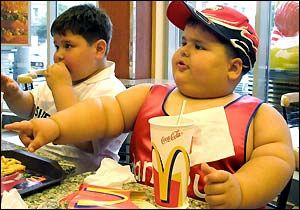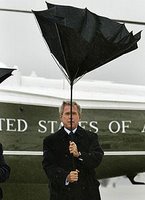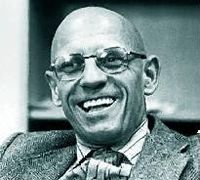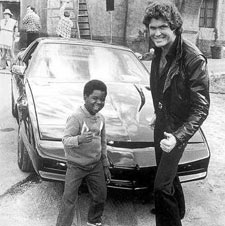 There was a TV-program called Kazakhstan Swings (More 4) which I saw yesterday. It featured some of the greatest artists working in the former Soviet satellite state Kazakhstan. Somewhere between the enormous concrete buildings and the flotsam and jetsam people below on the streets there seems to be a scene for modern art. This show reminded me of a of a series previously aired on Channel 4 called ArtShock (The show Is bad art for bad people in particular). However, ArtShock focused mainly on western artists. One artist represented in Is bad art for bad people was Paul McCarthy who's art is also exhibited in Moderna Museet during this summer (McCarthy at Moderna in English/Swedish). Dagens Nyheter had a piece about the exhibition (In Swedish: article/interview).
There was a TV-program called Kazakhstan Swings (More 4) which I saw yesterday. It featured some of the greatest artists working in the former Soviet satellite state Kazakhstan. Somewhere between the enormous concrete buildings and the flotsam and jetsam people below on the streets there seems to be a scene for modern art. This show reminded me of a of a series previously aired on Channel 4 called ArtShock (The show Is bad art for bad people in particular). However, ArtShock focused mainly on western artists. One artist represented in Is bad art for bad people was Paul McCarthy who's art is also exhibited in Moderna Museet during this summer (McCarthy at Moderna in English/Swedish). Dagens Nyheter had a piece about the exhibition (In Swedish: article/interview).Tuesday, June 20, 2006
Arty farty
 There was a TV-program called Kazakhstan Swings (More 4) which I saw yesterday. It featured some of the greatest artists working in the former Soviet satellite state Kazakhstan. Somewhere between the enormous concrete buildings and the flotsam and jetsam people below on the streets there seems to be a scene for modern art. This show reminded me of a of a series previously aired on Channel 4 called ArtShock (The show Is bad art for bad people in particular). However, ArtShock focused mainly on western artists. One artist represented in Is bad art for bad people was Paul McCarthy who's art is also exhibited in Moderna Museet during this summer (McCarthy at Moderna in English/Swedish). Dagens Nyheter had a piece about the exhibition (In Swedish: article/interview).
There was a TV-program called Kazakhstan Swings (More 4) which I saw yesterday. It featured some of the greatest artists working in the former Soviet satellite state Kazakhstan. Somewhere between the enormous concrete buildings and the flotsam and jetsam people below on the streets there seems to be a scene for modern art. This show reminded me of a of a series previously aired on Channel 4 called ArtShock (The show Is bad art for bad people in particular). However, ArtShock focused mainly on western artists. One artist represented in Is bad art for bad people was Paul McCarthy who's art is also exhibited in Moderna Museet during this summer (McCarthy at Moderna in English/Swedish). Dagens Nyheter had a piece about the exhibition (In Swedish: article/interview).Thursday, June 08, 2006
The fat of the land

I recently viewed a show called Tax the Fat (aired on More4). Just like the title suggests it explores the possibility of introducing a tax for being fat. This idea is put forward by Times columnist and restaurant critic Giles Coren who argue that health care for obese people - among other things - are costing the British taxpayers billions of pounds every year. Coren asks if the introduction of a tax for being a lard ass is a reasonable course of action that could solve the obesity dilemma.
This is obviously a highly opinionated documentary with strong personal polemic which may provoke many. On the other hand, I believe that this is a valid question. Most countries have taxes on tobacco and alcohol. This is in part because these products may cause damage to individuals health but it is also enforced to discourage people from buying things that are not good for them. Why should it be any difference between such products and the one's that make people fat? Giles Coren's answer to the problem was to tax individuals according to their BMI. I would deem his approach as a bit unrealistic. Are taxmen supposed to run around with scales when they're checking people’s taxes? And what happens if you are caught cheating on your tax return? People could always claim that they have gained a few pounds after filling in the tax form. Also, let’s not forget that one cannot tell whether a person is very muscular or just a regular fatty using the BMI method. Athletes usually have a very high BMI.
I think it would be more efficient to have a tax on fat food just like the one they have on fags and booze. Even though he does mention this possibility he quickly discards the idea. However, I think this might be part of the solution. Increase taxes on sugar and use the money collected to subsidise vegetables and fresh fruit. How hard could it be?
This is obviously a highly opinionated documentary with strong personal polemic which may provoke many. On the other hand, I believe that this is a valid question. Most countries have taxes on tobacco and alcohol. This is in part because these products may cause damage to individuals health but it is also enforced to discourage people from buying things that are not good for them. Why should it be any difference between such products and the one's that make people fat? Giles Coren's answer to the problem was to tax individuals according to their BMI. I would deem his approach as a bit unrealistic. Are taxmen supposed to run around with scales when they're checking people’s taxes? And what happens if you are caught cheating on your tax return? People could always claim that they have gained a few pounds after filling in the tax form. Also, let’s not forget that one cannot tell whether a person is very muscular or just a regular fatty using the BMI method. Athletes usually have a very high BMI.
I think it would be more efficient to have a tax on fat food just like the one they have on fags and booze. Even though he does mention this possibility he quickly discards the idea. However, I think this might be part of the solution. Increase taxes on sugar and use the money collected to subsidise vegetables and fresh fruit. How hard could it be?
Monday, June 05, 2006
When the shit hits the fan

Most people generally regard George W. Bush as a slightly dim-witted person, he is after all of Swedish decent. Everyone knows that he is the reincarnation of Adolf Hitler and that he doesn't care about black people. But what people don't know of is the fact that he is also responsible for global warming. In the BBC documentary Climate chaos: Bush's climate of fear the evildoing's of the Bush administration is revealed and it shows that George W. Bush is even more evil than previously thought.
British television has devoted a lot of thought to the global warming issue recently, one might call it; Climate Chaos Season. Sir David Attenborough has made a new series about it and he also appears in the Wildscreen festival opening debate entitled The Selfish Green. Another notable participant in the debate is Richard Dawkins (the author of "The Selfish Gene").
British television has devoted a lot of thought to the global warming issue recently, one might call it; Climate Chaos Season. Sir David Attenborough has made a new series about it and he also appears in the Wildscreen festival opening debate entitled The Selfish Green. Another notable participant in the debate is Richard Dawkins (the author of "The Selfish Gene").
Sunday, June 04, 2006
Post-modern stress
 Originally published Tuesday, May 16, 2006.
Originally published Tuesday, May 16, 2006.There is only so much different influences that one could take. While writing this iTunes (set on shuffle) started playing the theme from MASH (Robert Altman, 1970) "suicide is painless". This didn't make me think of committing suicide. However, it did made me think about how we are bombarded with different messages and ideas most of our waken time. The headline above was intended to be a pun derived from post-traumatic stress disorder. I'm nevertheless quite certain that it's possible to suffer from post-modern stress. Moreover I'd like to entertain the thought that this might be something that's a common condition for people of my generation. So, what is post-modern stress? This might be a real condition or disorder for all I know but in my mind it stands for the problem with all the data we have to interpret on a day to day basis. We're being flooded with information from all kind of media which is crippling ourselves. I personally find it hard to do anything creative while there is so many things to analyse, breakdown, comment, criticise and evaluate. The term postmodernism (or "pomo" in slang) itself is difficult to pin down. I guess the best thing one could do is to not think about pomo stress.
I'm being postmodern, before it's fashionable
Top ten films of the 80's
 Originally published Tues- day, May 02, 2006.
Originally published Tues- day, May 02, 2006.A friend of mine argued that there aren't any good films from the 80's. The guy challenged me to find five titles that could be considered worth watch- ing. I made a list of ten.
The Elephant Man (David Lynch, 1980)
Sjecas li se, Dolly Bell (Emir Kusturica, 1981)
Fanny och Alexander (Ingmar Bergman, 1982)
Blade Runner (Ridley Scott, 1982)
Amadeus (Milos Forman, 1984)
Brazil (Terry Gilliam, 1985)
Idi i smotri (Elem Klimov, 1985)
Barfly (Barbet Schroeder, 1987)
Nuovo cinema Paradiso (Giuseppe Tornatore, 1989)
Bacon and American Atheists
 Originally published Saturday, April 29, 2006.
Originally published Saturday, April 29, 2006.Since I've been tired I haven't been up to anything special during the day. However, while casually surfing the net I bumped in to an essay written by Sir Francis Bacon.
Bacon stated that "The contemplative atheist is rare" in one of the chapters in this essay. That might have been true during the Elizabethan era. However, I would argue that this statement could be questioned in present time. The only atheists that I think Bacon knew of came from the ancient times. He mentions a few so called "contemplative atheists" like Diagoras the Atheist and Lucian of Samosata. The latter might have been considered a pagan just like the the Indians Bacon is discussing from the newly discovered continents of the Americas (e.i. Native americans). Diagoras was a sophist and poet who denounced religion after being left unpunished by the gods for something he did. I'd say that there are some similarities with Diagoras thoughts and how people nowadays perceive paradoxes in - at least Christianity - religious teachings. However, there were a few atheists that Bacon may or may not have known of. An English dramatist, Christopher ("Kit") Marlowe, was accused of being an atheist in 1593. An interesting side note is that both Bacon and Marlowe have been thought to be the real author of William Shakespeare's plays.
I also stumbled upon an article on American Atheists web page. They argue that the expression "There are no Atheists in foxholes" was used inaccurately in connection to the war - I presume in Iraq - during an NBC broadcast. Interesting reading but I think that they might have missed the point of the expression, that soldiers in war are scared shitless and turn to religion in desperation.
I feel that I've wasted enough time on this subject now. Time to get something to eat.
Subscribe to:
Posts (Atom)
